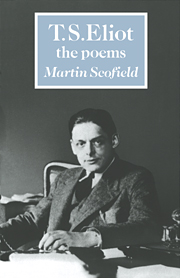Book contents
- Frontmatter
- Contents
- Acknowlegements
- Chronology
- Introduction
- 1 Aspects of the life of the poet
- 2 Early poetic influences and criticism, and Poems Written in Early Youth
- 3 Prufrock and Other Observations (1917)
- 4 Poetic theory and poetic practice
- 5 Poems (1920)
- 6 The Waste Land (1922)
- 7 From The Hollow Men (1925) to ‘Marina’ (1930)
- 8 Poetry, pattern and belief
- 9 From Coriolan (1931) to ‘Burnt Norton’ (1936)
- 10 ‘Burnt Norton’ (1936) and the pattern for Four Quartets
- 11 The wartime Quartets (1940–2)
- Notes
- Select bibliography
- Index
4 - Poetic theory and poetic practice
Published online by Cambridge University Press: 18 January 2010
- Frontmatter
- Contents
- Acknowlegements
- Chronology
- Introduction
- 1 Aspects of the life of the poet
- 2 Early poetic influences and criticism, and Poems Written in Early Youth
- 3 Prufrock and Other Observations (1917)
- 4 Poetic theory and poetic practice
- 5 Poems (1920)
- 6 The Waste Land (1922)
- 7 From The Hollow Men (1925) to ‘Marina’ (1930)
- 8 Poetry, pattern and belief
- 9 From Coriolan (1931) to ‘Burnt Norton’ (1936)
- 10 ‘Burnt Norton’ (1936) and the pattern for Four Quartets
- 11 The wartime Quartets (1940–2)
- Notes
- Select bibliography
- Index
Summary
We have already seen something of how Eliot's creativity as a poet is closely associated with his activity as a critic. The experiments of his poetry, his technical habits, the relation of his poetry to that of the past are all illuminated, whether directly or in passing, by his criticism. And so it is at this point, between the poetry volumes of 1917 and 1920, that many of his major critical ideas and formulations may be best examined. He published – and, it would seem, wrote – little poetic criticism before 1917; but in 1920 appeared The Sacred Wood, a volume which collected together various pieces already printed in periodicals, and in this volume some of his most important essays are contained. Indeed, many of the questions they raise continued to preoccupy Eliot in subsequent years, and he returns to them in later essays. So this chapter will not confine itself to the earliest criticism, but will take the opportunity to look at some of Eliot's main critical ideas about poetry across his career. Many of his ideas develop and change, and some of these developments will be examined in a later chapter, but certain of them remain constant – or at any rate remain central, with subtle shifts and adjustments and changes of emphasis occurring along the way – and a general view of them will be useful here.
- Type
- Chapter
- Information
- T. S. Eliot: The Poems , pp. 71 - 88Publisher: Cambridge University PressPrint publication year: 1988



